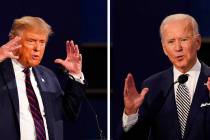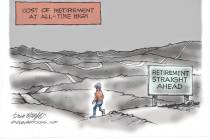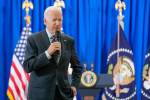Clinton cash proves principle
Give “Crooked Hillary” and WikiLeaks credit for providing a good opportunity to remind everyone of one of the fundamental truths in politics and policy: It’s the regulation that causes the corruption.
Proponents of smaller government have plenty of strong arguments. Less regulation is better for economic growth. Regulation is more effective if it happens locally, where it can be tailored and adjusted to circumstances, rather than nationally or globally, where regulators are remote from front-line knowledge. Individuals have inherent rights to control their own property and affairs.
One of the best arguments for less government, though, is that a smaller government is a more honest one. If government doesn’t spend a lot of money on contracts or grants, and doesn’t exercise a lot of power having the authority to approve or disapprove certain licenses or deals, then all of a sudden it’s not worth the money or the trouble to bribe or otherwise influence politicians or bureaucrats.
Nowhere is this more concretely and specifically illuminated than in the 12-page memo from 2011 written by Douglas Band, a longtime aide to Bill Clinton, that laid out the overlap between his own for-profit consulting business, Bill Clinton’s for-profit enterprises, and the Clinton Foundation charity. The memo, released by WikiLeaks, discloses the names of the clients of Band’s consulting company, Teneo. It also reports how much the Teneo clients gave to the Clinton Foundation, and, in some cases, how much they paid Bill Clinton in speaking fees or for other services.
The list of companies is a reminder of the government-relations adage that, “If you’re not at the table, you’re on the plate.”
The memo reports that the Coca-Cola Co., for example, gave $4,330,000 to the Clinton Foundation. That was when the then-mayor of New York, Michael Bloomberg, was pursuing a soda tax that spotlighted the adverse health effects of sugary drinks. Coke risked being known for obesity and diabetes, stigmatized as a public-health risk like tobacco. Given the power of government to tax or regulate the highly profitable beverage business, $4.3 million looks like small change.
Another Teneo client that was also a Clinton Foundation donor was UBS, a Swiss bank, which gave more than half a million dollars to the Clinton Foundation and also paid Bill Clinton personally $900,000 total for two speeches. Banks are highly regulated, facing government scrutiny on everything from their capital requirements to mortgage lending, interest-rate fixing, and compliance with anti-terrorism sanctions and Dodd-Frank.
A third Teneo client that also was a Clinton Foundation donor was Laureate International Universities. “Laureate pays President Clinton $3.5 million annually to provide advice and serve as their honorary chairman,” the memo says, noting that Laureate also gave $1,401,332 to the Clinton Foundation. Federal Pell Grants, subsidized loans and regulation of for-profit private universities have, meanwhile, been all over the headlines.
Other Teneo clients that were named in the memo and have recently been in the news include AT&T and Mylan. Donald Trump has promised to block AT&T’s proposed purchase of Time Warner, which owns CNN. Hillary Clinton has been less definitive. It’s an $85 billion deal. If hiring Teneo can help get the deal or a similar one approved, its fee is a rounding error by comparison. Mylan, meanwhile, is the pharmaceutical company that makes the EpiPen injector to fight allergic reactions; its price increase sparked a furious backlash, including from Mrs. Clinton. Again, whatever it might cost to hire Teneo is small compared to Mylan’s EpiPen profit stream.
It’s certainly possible these companies were hiring Teneo and Bill Clinton and giving to the Clinton Foundation strictly on the merits. One good way to test that proposition would be to give government less taxing, spending and regulating power over businesses. Then, see if Clinton’s cash flow starts to slow.
Ira Stoll is editor of FutureOfCapitalism.com and author of “JFK: Conservative.” His column appears Sunday.























